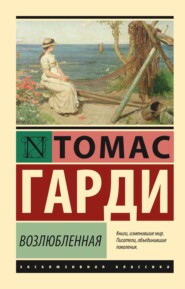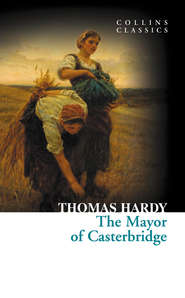По всем вопросам обращайтесь на: info@litportal.ru
(©) 2003-2025.
✖
Far From the Madding Crowd
Настройки чтения
Размер шрифта
Высота строк
Поля
Here the spot stopped, and dwindled smaller. The figure was stooping. Then a morsel of snow flew across the river towards the fifth window. It smacked against the wall at a point several yards from its mark. The throw was the idea of a man conjoined with the execution of a woman. No man who had ever seen bird, rabbit, or squirrel in his childhood, could possibly have thrown with such utter imbecility as was shown here.
Another attempt, and another; till by degrees the wall must have become pimpled with the adhering lumps of snow. At last one fragment struck the fifth window.
The river would have been seen by day to be of that deep smooth sort which races middle and sides with the same gliding precision, any irregularities of speed being immediately corrected by a small whirlpool. Nothing was heard in reply to the signal but the gurgle and cluck of one of these invisible wheels – together with a few small sounds which a sad man would have called moans, and a happy man laughter – caused by the flapping of the waters against trifling objects in other parts of the stream.
The window was struck again in the same manner.
Then a noise was heard, apparently produced by the opening of the window. This was followed by a voice from the same quarter:
‘Who’s there?’
The tones were masculine, and not those of surprise. The high wall being that of a barrack, and marriage being looked upon with disfavour in the army, assignations and communications had probably been made across the river before to-night.
‘Is it Sergeant Troy?’ said the blurred spot in the snow, tremulously.
This person was so much like a mere shade upon the earth, and the other speaker so much a part of the building, that one would have said the wall was holding a conversation with the snow.
‘Yes,’ came suspiciously from the shadow. ‘What girl are you?’
‘O, Frank – don’t you know me?’ said the spot. ‘Your wife, Fanny Robin.’
‘Fanny!’ said the wall, in utter astonishment.
‘Yes,’ said the girl, with a half-suppressed gasp of emotion.
There was something in the woman’s tone which is not that of the wife, and there was a manner in the man which is rarely a husband’s. The dialogue went on:
‘How did you come here?’
‘I asked which was your window. Forgive me!’
‘I did not expect you to-night. Indeed, I did not think you would come at all. It was a wonder you found me here. I am orderly to-morrow.’
‘You said I was to come.’
‘Well – I said that you might.’
‘Yes, I mean that I might. You are glad to see me, Frank?’
‘O yes – of course.’
‘Can you – come to me?’
‘My dear Fan, no! The bugle has sounded, the barrack gates are closed, and I have no leave. We are all of us as good as in the county gaol till to-morrow morning.’
‘Then I shan’t see you till then!’ The words were in a faltering tone of disappointment.
‘How did you get here from Weatherbury?’
‘I walked – some part of the way – the rest by the carriers.’
‘I am surprised.’
‘Yes – so am I. And Frank, when will it be?’
‘What?’
‘That you promised.’
‘I don’t quite recollect.’
‘O you do! Don’t speak like that. It weighs me to the earth. It makes me say what ought to be said first by you.’
‘Never mind – say it.’
‘O, must I? – it is, when shall we be married, Frank?’
‘Oh, I see. Well – you have to get proper clothes.’
‘I have money. Will it be by banns or license?’
‘Banns, I should think.’
‘And we live in two parishes.’
‘Do we? What then?’
‘My lodgings are in St Mary’s, and this is not. So they will have to be published in both.’
‘Is that the law?’
‘Yes. O Frank – you think me forward, I am afraid! Don’t, dear Frank – will you – for I love you so. And you said lots of times you would marry me, and – and I – I – I –’
‘Don’t cry, now! It is foolish. If I said so, of course I will.’
‘And shall I put up the banns in my parish, and will you in yours.’
‘Yes.’
‘To-morrow?’
‘Not to-morrow. We’ll settle in a few days.’
‘You have the permission of the officers?’
‘No – not yet.’
‘O – how is it? You said you almost had before you left Casterbridge.’

















